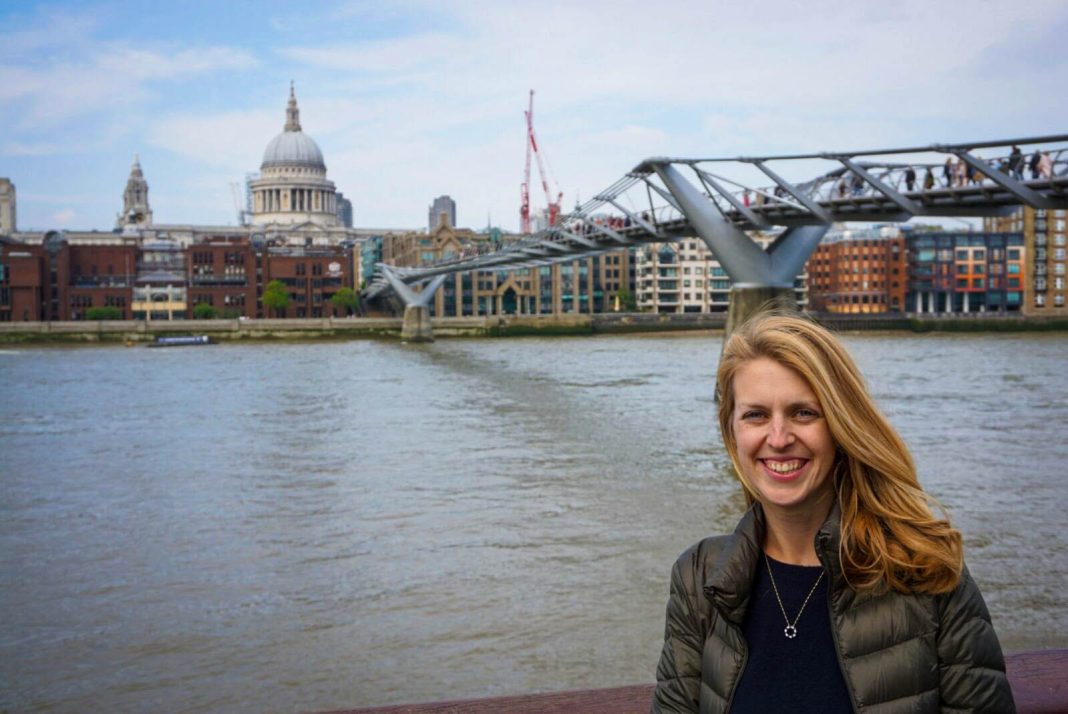Frances Bean joined the Carbon Trust, a mission-led sustainability consultancy in the UK, in 2018. As Manager in the Cities and Regions team, she supports municipalities and public bodies to understand and achieve their net zero commitments. The question cities often have is “where do we start?” By talking organisations through their ambitions, scaling of that challenge, and choices for decisive action, Frances delivers the answers for decarbonising cities.
For six years, Frances Bean worked on EU climate and energy policies for various organisations, think tanks, and consultancies in Brussels and London. She defines this position as a lobbyist… “but a good one”.
Having already worked in jurisdictions as diverse as marine environment, farming, and eventually energy, Frances has spent strengthening energy efficiency targets and improving national policies. With the new technologies emerging, it was the energy topic that really excited her.
It was high-level work, penning binding international directives. And Frances admits energy efficiency targets really do impact on carbon dioxide emissions. But she couldn’t stay there forever. “Something that really drives me insane,” Frances quips, “is writing a report that sits on a shelf and just stays there forever and no-one picks it up ever again.” Our CityChanger felt the fabled ‘EU bubble’ forming around her – important work but little direct encounter with the results of what she was doing.
A hunger for more hands-on influence led Frances to the Carbon Trust where the effects within cities are tangible. “It gives you a really different level of satisfaction,” Frances tells us.
When Needs Must: Carbon Trust
Among other services, the Carbon Trust is a global climate consultancy, working with businesses, governments, and organisations with a mission to accelerate the move to a decarbonised future. The Cities and Regions team specifically provides energy audits, technical site visits, facilitated workshops, and advice on implementing net zero opportunities at scale.
The organisation supports both the public and private sectors. Frances has a public body focus: councils, health services (NHS Trusts), colleges and universities, fire and rescue services, ambulance services. There is a modicum of difference in the challenges for corporates, but both arms of the organisation work similarly.
Net Zero Responsibilities
In many cases, authorities are bowing to public pressure to decarbonise. Frances recognises “a massive change” in her time with Carbon Trust. “You’ve got a lot of councils declaring climate emergencies,” our expert observes. They are committing to be net zero by 2050. Or even earlier. Hitting ambitious targets for 2030 requires significant change, but they’re left scratching their heads not knowing what to do.
Many councils will approach the organisation directly, knowing they need help to formulate an actionable plan. Carbon Trust also bids for appropriate tenders, recognising where they can make a difference. Every project begins the same way.
Measure For Measure
Our expert cannot emphasise enough how important the first step is: Carbon Trust helps clients calculate their carbon footprint. “Without knowing what that is, you don’t know what to focus on, and you don’t know how much you’ve got to do.”
Like some other CityChangers, Frances doesn’t consider fact and figure yardsticks the be-all-and-end-all – we could make changes regardless. However, this does provide recognisable starting points and measurable targets.
Counting for the Accountable
For city authorities accountable for the public money they spend, figures create a feasible business case.
Whether we’re talking about retrofitting a single building with insulation, or replacing city-wide streetlighting with LED bulbs, interventions are usually expensive. This needs buy-in, in terms of investment but also influential backing.
Real change, Frances notes, is long-term. Quantifiable numbers allow us to demonstrate what energy savings and carbon emission reduction looks like. “And then from that,” she adds, “it’s hopefully much easier to secure budgets and make sure it really happens.”
Hold an Intervention
With the building blocks defined, Frances works with clients to “start exploring projects and interventions that can be made to reduce emissions”.
Municipal authorities often have diverse and widespread building stock, including residential and offices. Carbon Trust looks to the horizon: rather than home in on a single property or category of building, Frances identifies with the authorities the opportunities across their jurisdiction, then helps them translate that into a plan.
What’s the Big Deal About a Low Carbon Economy?
“We’re already starting to see the impacts of climate change,” our expert recognises. If we don’t do anything, London’s recent “weirdly warm” and unusually dry springtimes will become a projection of the unpredictable seasons ahead.
Frances describes this in a very human way:
“It’s actually starting to get quite scary.”
While activists and nay-sayers battle over the science of climate change, we’ve lost any emotional connection: our natural world is changing and it endangers our known way of life. And it is scary. “If we don’t do anything, it’s just going to get worse.” For one thing, our food and water supplies will be depleted.
It’s necessary, stresses Frances, to increase the public-political pressure to decarbonise. How?
“We need to find ways to talk to people about it. To get those people on side, including those that are just very happy with the warmer weather and think, actually, there are some positives here.”
Decarbonising Cities: The Challenges
Like many countries, the UK is still reliant on natural gas for energy. Shifting this in the public authority-owned building stock will have a key role in overall transitions, our CityChanger believes.
The age of the building and how it is used and occupied creates variables that need tailored solutions. Through these innovations, local authorities have an “opportunity to showcase what can be done” and lead by example with successful initiatives that the private sphere could replicate.
Frances mentions heat pumps as a viable alternative to gas boilers. As fossil fuel prices skyrocket, heat pumps are becoming the more affordable option to install and run. This can slow the increasing threat of fuel poverty. It adds meat to the bones of the business case.
Ten years after heat pump field trials, Frances imagined their use would be a lot more commonplace than it turned out. Where new gas boilers replaced old, the opportunity for a low carbon alternative “is then missed for another 10 years”. This happens for these reasons:
- If it works, we stick with what is familiar.
- New tech was more costly.
- Necessary skills for installing low carbon technology were lacking and customers had to make extra effort to find a trained professional.
- Unlike homeowners, estate managers need to convince senior management and budget holders to back the change – armed with a robust business case.
“But I think we’re potentially on the cusp of it becoming a lot more widespread,” Frances predicts, “because the financials stack up and people want to move away from gas, and we are getting there with the installation process”.
Open Doors
Frances recalls a project with the Zero Carbon Oxford Partnership. Carbon Trust was brought in to help key stakeholders from industry, transport, energy, health, and education to develop a roadmap and action plan to hit the City of Oxford’s net zero target. There was a lot of knowledge in the room. It just needed unlocking.
Frances’ team untangling what was needed in terms of shift – how many heat pumps, what it takes to move towards active travel, for instance. But this also acted as a catalyst for partners’ own ideas.
For example, it became clear the different sectors all had thoughts on trialling hydrogen solutions. Brainstorming facilitated by Carbon Trust established some ground for joint development, which would also increase buy-in potential. “It didn’t necessarily need very specialist or technical insight from a Carbon Trust perspective,” our CityChanger recalls, “It was more about bringing together people in the room to think. It was just so satisfying to see.”
Even if one idea eventually proves fruitless, it’s a partnership formed, talks had, and concepts tested. It all paves the way for the next collaborative solution.

Closed Doors
The major challenge, in Frances’ experience, is when the right people are not involved or leave. The project can fall flat.
It can become clear even after a handful of workshops that the city representative isn’t 100% behind the idea. Or a key someone is replaced at the end of the project and the new personnel has too little time or inclination to engage. Action plans and strategies that don’t have the right support can “then become that dreaded report that sits on a shelf”.
“That’s the thing that to me couldn’t be more of a failure, because you’ve missed that moment and opportunity.”
A chunk of Frances’ role is about working with the council or organisation to establish and suggest who should be there from the start. “We have a lot of discussions with the direct project lead,” she says of the prevention strategy.
Another issue can arise when actors fail to understand their significance. “It involves people that don’t usually have to think about climate in respect to their job on a daily basis.” Procurement culture being a prime example.
Sustainable cities need to consider their entire supply chain. Minimising the carbon impact of goods and services requires engagement from finance directors or procurement teams. They can be cagy with the data Frances needs to calculate carbon footprinting. Convincing them of their role in environmental projects can be difficult but, as she points out, these issues are starting to touch on everybody’s jobs. It’ll get easier.
Little Progress is Still Progress
Frances is quick to distance her advice from suggesting citizens tell decision-makers to approach Carbon Trust. But with her former lobbyist hat on, our CityChangers calls on the people to push for cities to take accountability for their carbon output.
“If the public are saying that this needs to happen, it’s a big tick in the box to say this is where we should be spending taxes.”
We need to see immediate movement. Public pressure has a role in “ensuring that action is being taken and it’s not being ignored. It’s not being pushed down the line for the next administration”. Citizens, planners, practitioners, service providers – we can all keep public-political attention focused on the municipality’s commitments.
Local councils that have declared they will be carbon free by 2030 have a tough challenge ahead. Some won’t achieve it. Our expert explains that this shouldn’t be “perceived as backtracking”.
“Keeping it on the agenda is really important and does help councils go down a certain direction,” Frances adds. If they’re committing and taking steps to reach their targets, that’s improvement. After all, to get anywhere, “you’ve got to make a start, you have got to be doing something”. And something is better than nothing.
Decarbonising Cities in a Nutshell
In her work with Carbon Trust, Frances Bean shows us the logical steps public bodies can follow to decarbonise. Establishing measurables, building a business case, and getting the right people on board – across the city ecosystem – creates a basis for positive transition. People’s reluctance to accept their role in sustainability can be a hindrance, so it’s important to establish the right messages. Equally as vital is a city-wide perspective, geographically and systemically. With this in place, Frances believes hopefully, can we at least meet most of our ambitions for a net zero 2050.


